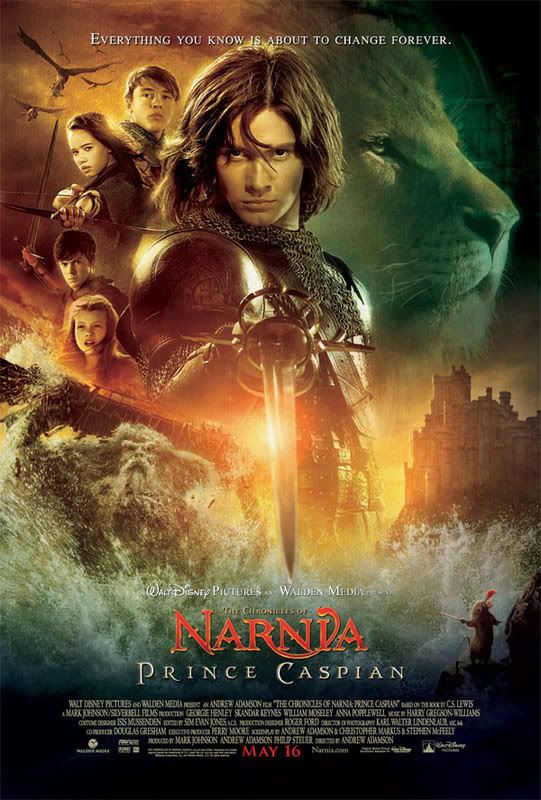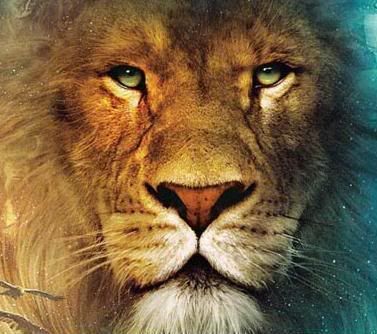
Having said that, I'm going to discuss Prince Caspian two ways: First comes my attempt at a traditional review, largely void of book comparisons. Then more of a movie-book open forum, filled with SPOILERS, with thoughts on the various similarities and differences. Here we go...
In case you haven't seen the trailer, Prince Caspian occurs one year after The Lion, the Witch, and the Wardrobe. One year of time in the Pevensies' world, but over a thousand years in Narnia. The four children soon get to Narnia, where they soon find themselves in the midst of a conflict between Narnians and the Telmarines, an enemy intent on their destruction. The titular character is a young Telmarine who sides with the Narnians and hopes to restore their glory, although he is still learning about their plight and history.
Much like its predecessor, Prince Caspian effectively creates the world of Narnia, complete with anthropomorphic creatures, both familiar and mythical. With improved CGI, the wizards at WETA have created several impressive characters, like Trufflehunter the Badger. Others, like Reepicheep and Pattertwig, seem more cartoonish, but some of that can be chalked up to the mere curiosity of large talking rodents. Establishing this world is vital, because the entire appeal of the movie, to all parties, depends upon this engaging culture.
The movie generates several fantastic movie moments ranging from a rearing centaur to Lucy's wide-eyed face of wonder. The ability to do both big and small moments well keeps the film moving from start to finish. The battle scenes are generally impressive, longer and more intense than LWW, but still lighter than Lord of the Rings, which is obviously a model for this movie. What makes Caspian interesting are the soft scenes in between, when you learn of characters' inner turmoil and motivations, and you are more likely to hear the smile-inducing beauty of familiar lines quoted directly from the book. Having said that, nearly all of the characters could use a little fleshing out. Most of them find their key note or two and play it a little too often, and conflict seems occasionally forced. With five primary characters plus several key supporting roles, the screen time for each is limited, a necessary but unfortunate evil that results in the partial misrepresentation of a few participants.
Without delving too deeply into the comparisons (see below), I will say that during the movie, many of the deviations from the book seemed to make sense cinematically, and a few other creations were executed well enough despite their seeming betrayal of the book. In the end, the pure Narnia-ness of everything overpowered the occasional raised eyebrow and allowed me to enjoy the unique world portrayed on screen.
LWW was clearly a better movie for those who had cherished the book. In many ways, Prince Caspian is the opposite. Book loyalists may be driven mad by the variations, even though the movie itself is cumulatively better.
Bottom Line: I loved the movie, not in a this-is-the-best-movie-ever sort of way, but because of how much the story and characters mean to me. But it was still a pretty good movie. 8 of 10.
Ratings note: There's no way this should have been rated merely PG. Many thought LWW should have been PG-13, and this is much more violent. With the exception of a semi-seen decapitation, it isn't very graphic, but it is violent. Don't take young kids.
Now, on to more entertaining things...
***MAJOR SPOILER ALERT!!!***
There were plenty of changes, both big and small. Although the big ones will gain more notoriety, the small ones bugged me more. Let's take a look...
--As I mentioned above, on the whole, I'm okay with most of the changes. Quite frankly, a straightforward adaptation of the book would have been fairly dull. There isn't much conflict, on an interpersonal or intercultural scale, which would have made for a movie that would interest the book-lovers, but alienate the general public. I don't agree with everything that was altered, but I do understand the cinematic reasons behind many of the changes.
--While much of the book is told in flashback, the movie runs the stories parallel, which is a very good decision. The opening sequence of Caspian fleeing the castle is excellent, quickly sucking the viewer into the world of Narnia.
--The most obvious addition is the raid on Miraz' castle, which in the book is merely a quickly discarded suggestion by Reepicheep. However it worked very well in the movie, allowing for some sweet scenes involving eagles/griffins and various other fighting Narnians. It also eliminated the one weakness of the book, which is the deus ex machina feel that the Pevensies bring when they quickly end the succinct conflict. The battle and its fallout also adds to the contrived Peter-Caspian issues the movie portrays. I was okay with this whole sequence, because it worked well within the movie, and it was entertaining to see familiar characters in new and exciting circumstances.
--When the trailer showed the White Witch, I was a little concerned, since the only mention of her in the book was when Nikabrik fondly mentions her as a possibility of their cause. In the movie, that comment is expanded into a scene in which two creatures use Dark Magic to revive her. With lines pulled straight from the book, they nearly seduce both Caspian and Peter into her trap. This scene was brilliant, a great dramatic addition. It also let Edmund pull off perhaps my favorite swordfighting move of the film, when he raced up a couple steps before whirling and crashing his sword down on the head of the pursuing werewolf, before going on to save the day.
--My only problem with this scene is one that pervades the movie: Edmund is more Peter than Peter is. While Peter does make one bad decision in the book, it is an anomaly, not a character flaw. The movie plays Peter and Caspian off each other frequently, and Peter is usually portrayed in a less flattering light. He should be the High King, demanding and giving respect, not making multiple ill-fated choices. To me, these alterations are more disappointing than adding a massive battle, because they violate the spirit of the book, the maintenance of which is the key in adapting literature to the big screen.
--C.S. Lewis was very intentional not to include Susan and Lucy in battles. Maybe this seems a bit old-fashioned now, but I was still cringing as Susan again waded into the thick of war, going all Legolas with her bow and arrow. Even Lucy became slightly involved, which was even more disturbing. I admit that Susan's role in particular was consistent and worked fairly well, but like the tweaks to Peter's character, felt that it violated the spirit of the book a good deal.
--Caspian himself is played around age 20, which is about six years older than he is in the book. But given the movie that was being made, he had to be 20. A 14-year old Caspian would not have fit into the more violent movie. I think he also should have had golden hair, per Voyage of the Dawn Treader, but I can't say that bothered me much. Lucy was also blonde in LWW, but I always thought of her as brunette for some reason. Plus Georgie Henley captures her sense of innocence and wonder so perfectly that I could care less.
--From reading one message board, plenty of people are bent out of shape by the Caspian-Susan romantic angle, particularly by her goodbye kiss. I would also rather the whole arc have been omitted, but at least it didn't come out of nowhere at the end. Like many other changes, it was executed well enough via numerous hints throughout the film. I was perhaps more annoyed that Susan would flat-out lie to the boy at the train station. I suspect that Lewis would frown more upon a character violation of that ilk.
--I know there were plenty of other omissions, but most were logical. Yes, it would have been great to see the dance on the lawn or the party that Susan and Lucy had with the woodfolk. But scenes like that, although fascinating, would not have advanced the story much. When a book, even a short one like Prince Caspian, is compressed into a 2:20 movie, scenes like that have to go.
Had Peter been portrayed better (it may have something to do with the actor, who never struck me as exceedingly Peter-like) and his invented conflict with Caspian played better, I might have been perfectly content. As it was I was still satisfied. I am extremely excited for Voyage of the Dawn Treader, which will feature the two younger Pevensies, the most likable of the quartet. I think Voyage is the most movie-friendly of all the books, with plenty of opportunities for exceptional scenes and sequences, driven by both action and dialogue.

